
Derick Fabert and Anna Carrera met when they both worked at WCIA, where Carrera was a reporter and Fabert was a meteorologist. The two have had to adjust their May 2 wedding plans amid concerns surrounding the COVID-19 pandemic.
THE HAPPY COUPLE
With wedding party postponed, the future Mr. and Mrs. are trying to keep their spirits up
A faint thought entered the minds of Derick Fabert and Anna Carrera on March 12 as they noticed the cascade of cancellations and postponements of sports leagues and large events over a 24-hour period due to the coronavirus pandemic.
Those were massive events with thousands of people, though. Their May 2 wedding would be safe, they thought.
“You never thought something with less than 150 people at it would be canceled or postponed,” Fabert said a week later from his Indianapolis office, isolated from co-workers.
In just a few days, though, the country’s perspective shifted cataclysmically. The Centers for Disease Control and Prevention’s guidelines for limits on gatherings kept lowering. And their thoughts changed, as well.

Derick Fabert and Anna had to postpone their May 2 wedding reception because of concerns surrounding the COVID-19 pandemic.
As a research communications manager for Indiana University’s School of Medicine, Carrera was more informed than most about COVID-19 as it crept across the world. Researchers who normally tamp down hype and hysteria were already sounding alarms about the disease.
By Monday, reality sunk in for the couple who met while working in Champaign for WCIA, where Carrera was a reporter and Fabert a meteorologist.
Then they received the call from the reception venue.
They wouldn’t be having their wedding May 2, at least not the way they had planned.
“I called my mom and I just started crying,” Carrera said. “It’s one of those things where you know that everybody has been impacted by this, but the parts that hit you hit hard. And for us, this was a thing that we’ve been working on and have been so excited about, and I couldn’t explain it.”
“I just started crying. I was like, ‘I don’t know why I’m crying.’ We’re still going to get married, and we’re still going to get together with our families and friends at some point, but there’s still this uncertainty, and to kind of have to re-do so many things, it’s hard and it’s scary.”
So they split up their guest list and began personally texting each family member and friend a gut-wrenching message.
“I did tell my family members that the wedding is not postponed because of something I messed up, which would not be a bad assumption, but because of the coronavirus,” Fabert said. “We got a lot of love back. No one said, ‘Oh, I just booked my plane ticket.’ It was all, ‘Let us know what we can do and when we can be there.’”
Fabert and Carrera haven’t lost perspective, which Fabert credits to his fiancee. They realize people are suffering from illness and missing loved ones who are self-isolating.
And they’re still planning on getting married May 2, even if that means having their pastor come to their house with a few loved ones present.
“There are so many things outside of our control,” Carrera said. “It just makes you grateful for the things you have and the people you care about, and you want to make sure that you hold onto those things and those people.”
THE GRIEVING FAMILY
‘It would have been a huge funeral’

Bob Picklesimer, owner of Creative Dramatics Workshop and Homer Opera House, died on Friday, March 20, 2020. Because of the COVID-19 pandemic, the family of the beloved member of the local theater community, shown above in 2011 at Creative Dramatics Workshop's former home, will be forced to hold a private funeral.
Mike Picklesimer held back tears on Tuesday, forcing words out in front of a small room of his closest family and friends.
This funeral was unique for the pastor at Sidney United Church, and not just because the audience was restricted to only a few close family members due to the COVID-19 pandemic.
He was laying his big brother, Robert, to rest.
“It was difficult to get through,” Mike said. “I’ve done a lot of funerals, but this one was a lot different.”
During a normal time, the room would have been filled to the brim. Robert, known as Bob to those outside his family, cared immensely about other people. And they reciprocated.
But this is an unprecedented situation. So instead of holding a large funeral with dozens of actors he mentored at Creative Dramatics Workshop and fellow postal union co-workers, the ceremony was held with his parents, his brother and two sisters, and the nieces and nephews he adored.
Throughout his life, Robert poured himself into other people. He was a lifelong bachelor, but he rarely missed one of his niece’s volleyball games. He even made the trek to nearly every game when Annie began coaching at Westville a few years ago.
At the last family Christmas party, the 66-year-old who’s struggled with complications from diabetes painfully lowered himself down onto the ground with his great-nephew, Harrison, and played games for hours.
“He just did these things that went above and beyond,” said his niece and Harrison’s mother, Ellen Heitzig. “He never asked for anything from it, he never asked for recognition, he just did it out of the kindness of his heart, and I think that’s the big piece.
“He just had a huge heart and he wanted to serve his community, he wanted to serve his family and did so.”
In 1996, the rural mail carrier with a master’s degree in theater bought an old church building in his hometown of Sidney. He set aside one room for living quarters, and he formed Creative Dramatics Workshop, a theater company for children of all ages. The child actors, though, didn’t simply perform children’s plays. Among other productions, they’d perform Shakespeare, and Bob wouldn’t dumb down the dialogue, instead teaching them about the meaning of the language.
“They just tell the story,” he told The News-Gazette in 2011. “I have some 12-year-olds who I'd match against professional adult actors. ... The trick is to learn not to beat the talent out of them. You have to learn how to enhance what they have.”
His mother always thought he would have made a good school teacher, but she knows he fulfilled that role at his theater.
He would direct several plays a year, and most of the money needed to put on productions came from his own pocket. After a wall collapsed at the old church, he bought the Homer Opera House and restored it for his theater company.
He also had another world, the National Rural Letter Carriers Association. At one point, he ran for national president, and he attended the national convention every year, even last year as his health failed.
Beyond his parents, siblings, nieces and nephews, Robert made it a point to stay close with his extended family, each year attending a family reunion in Kentucky.
His funeral would have fused those worlds. Loved ones would have laughed and cried as they told stories of their old friend, uncle, cousin, co-worker, director and mentor.
“It would have been a huge funeral, and a lot of tribute to Robert,” said his mother, Betty. “But this coronavirus, you know, we just couldn’t do that. We couldn’t ask people to come. Not just for our sake, but for them. You don’t know where you’re going to contract that silly stuff.”
The family plans on holding a celebration of life when it’s safe, possibly at the Homer Opera House. But on Tuesday, the close family he cared about so much stood up, told stories and cried together before making the trek to the cemetery to bury Robert.
There was beauty in the small gathering. But it was also heartbreaking for a family that knew that so many people were grieving outside that room.
“I’m very glad that I was able to do it, and with a smaller, intimate group, it worked well,” Mike said. “It was nice that we had the intimate time together as family, but in some way, I wish we could have had the full-blown funeral and visitation. It feels as though we kind of robbed others from their formal goodbye, let’s say. And we blame it on that crazy virus.”
THE BAR OWNER
Employees are No. 1 priority
Tumble Inn owner Toby Herges wrestled with the decision last week of whether to close his bar to protect his loyal patrons.
He didn’t wind up having to make the decision after Gov. J.B. Pritzker ordered all bars and restaurants to close at the end of business on Monday.
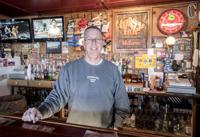
Tumble Inn owner Toby Herges, shown here on Jan. 9, 2019, is under self-quarantine during the coronavirus pandemic because of underlying health concerns. Herges thinks his bar will make it through its mandated closure as long as it doesn't last too long.
“In a way, it’s been a relief, because in the days before the governor made the call, we said, ‘Should we close for the good of our employees and all of our customers?’” Herges said. “Should we do that to kind of get ahead of the game?
“Fortunately, we didn’t because now everyone’s got to do it and we’re all in the same boat.”
Herges, who is self-quarantined because he’s had chemotherapy three times, thinks his bar will be able to weather the storm until it’s allowed to reopen, as long as it’s not too far off in the distant future.
“Like everybody else, we’re going to just kind of batten down the hatches. We told our employees, ‘We’re going to take care of you as long as this takes two weeks to two months, not two months to two years. We’ll do our best. We’re going to take this opportunity to do some things. I think we’re going to put new floors in the bathrooms and do a nice, deep cleaning that it hasn’t had in awhile.”
Herges was more confident a few days ago, when he thought a “loss of business” insurance rider would protect him from losses. Then, he found out the rider carries an exemption for infectious diseases, so it’s unlikely he’ll see the money.
“It’s tough, because we’re always talking about, ‘We’ve got to be not so concerned about what happens today, but what happens a year from now, so look after the customers first and business will take care of itself,” Herges said. “So, that’s what the quandary was. It’s hard to decide.”
THE LITTLE LIBRARY
‘A way to continue to make a connection’
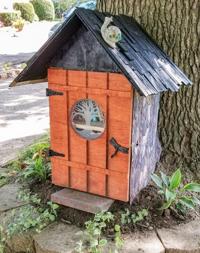
Kristine McCoskey hopes the Little Free Library she put in her front yard in 2017 can become a way for people to 'passively connect' with their community during the coronavirus pandemic.
Kristine McCoskey had a vision as she looked at the large Sweetgum tree in her front yard three years ago.
She’d heard about the Little Free Library movement, wherein people build a tiny “library” on their front lawn, stock it with books and allow members of the community to take books and leave them as they please.
So, as part of the Informatics class that she took for her doctoral program at the University of Illinois, she artfully crafted an intricate door with a Tree of Life design, attached it to a box she had put together from scratch, stocked it with books for both children and adults and affixed it to a tree in her front yard.
“I was like, ‘Nobody’s going to use this. It’s more for me than anybody else,’” she said. “And I was shocked. We’ve had so many people come by. We’ve had people knock on our door and thank us for it and I’ve had hand-written notes left in the library thanking us for having it out.”
McCoskey, who lives a few blocks away from Westview Elementary School, regularly restocks the books, and she revels in the interaction between book-lovers who never see each other, and who she rarely catches a glimpse of.
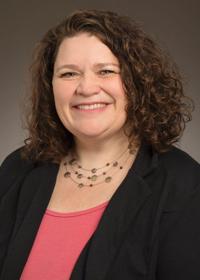
Kristine McKoskey
“I think it’s just a way to passively connect with your community,” she said, “and I really appreciate that.”
Before last week, she couldn’t have envisioned just how important that passive interaction could become.
Amidst concerns over the spread of the COVID-19 pandemic, libraries have closed, and people are encouraged to limit in-person meetings. In a time when people are told to stay apart, she hopes her Little Free Library is a way for people to safely engage with the people and the world around them.
“We’re taking on something that’s strange and challenging and scary. It’s asking us to step outside of ourselves and be extraordinary in many ways,” she said. “So I think it’s kind of a way to continue to make a connection without making necessarily a physical connection.
“I think that as we move farther into this process of social distancing and isolation, the more we’re going to crave some sort of interactivity in some way. Technology provides a great platform for us to do that now, but I think that things like this are another way that we can connect with each other.”
THE SOCIAL WORKER
Staying in contact
As a truancy officer for the Champaign school district, Rickey Parks takes care to go into homes and build relationships with families.
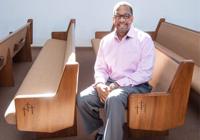
Pastor Rickey Parks, shown here in 2015, has tried to stay in touch with the students he works with as a Champaign school district truancy officer while those kids are out of school.
“We meet the kids in a different setting,” Parks said. “Oftentimes, we meet them at home and it’s kind of on their turf, if you will. We get to see the home life, and we also get to see what’s the deterrent for them coming to school, and we get to sit with the parent and make a plan. We build relationships with the kid, one with the parent, and one with the entire family. We’re putting plans together, talking about their future.”
When he left work on Wednesday, he knew he wouldn’t have in-person contact with those kids for more than a week because of spring break. As it turned out, it’s likely to be much longer.
Parks, though, is staying in contact with the kids he can get to. As pastor at Pilgrim Missionary Baptist Church, he has different avenues to reach kids. Some are in his congregation. Some, he reaches on SnapChat. He tells some kids to forward his texts along to others.
“I just say, ‘Hey, it’s going to be OK,’” Parks said. “This too shall pass. Remember to wash your hands and to not touch your face. Stay in the mode of school — keep reading, keep writing and keep learning.”
THE AT-RISK KID
‘Worried every day’
On a given day, the sound of roller skates grinding against the hard floor might echo off the walls of the large, heated shop on the Klein family’s farm just outside of Seymour. Volleyballs might slam to the ground, and bikes may turn sharp corners.
Among people who have to quarantine, the Kleins consider themselves lucky. They have ample space to roam when they need to burn off some energy and sequester when they need some space.
“We are definitely having some good family time,” Jackie Klein said. “I told the girls that we can divide up the sheds and take our own if we have to. That’s the bonus of our farm.”
For the Kleins, though, the situation is gravely serious.
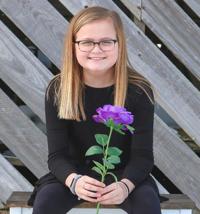
Maggie Klein, a third-grader at St. Matthew Catholic School in Champaign, is particularly vulnerable to COVID-19 because she has cystic fibrosis.
Living with fear and precaution isn’t new to them. Maggie, the youngest of Jackie and Paul Klein’s three daughters, has cystic fibrosis, meaning any illness can lead to infections that cause permanent damage. The COVID-19 pandemic, though, takes that concern to a whole new level.
“We’re worried every day,” Jackie said. “Viruses are around all the time that can affect people with cystic fibrosis. The worry now is a little more challenging for us.”
So the Kleins pulled Maggie, a third-grader at St. Matthew Catholic School, out of class last Wednesday, before schools across Illinois officially closed down Monday. Her two sisters, 15-year-old Addi and 13-year-old Elle, are now also sequestered on the farm.
It’s early in planting season, meaning it’s a busy time on the farm, but right now the family has to work with a few truckers and not many other workers. While home, the girls will help out with the 60 beef cattle in between scheduled study sessions.
That schedule, Jackie said, will begin after this week’s spring break to bring normalcy to a strange new reality that will last an undetermined amount of time. It’s difficult, Jackie said, to tell teenagers that they won’t be able to see their friends, possibly for months, while remaining home, but they’re making the most out of their time together.
“Someone’s going to be a PE teacher for a day, someone’s going to be the art teacher for the day, somebody’s going to plan our dinner and be the chef, things like that,” Jackie said. “We’re working in the barn and that kind of thing that will keep us going.”

Champaign-Urbana Mass Transit District bus driver Robin Welch still greets riders with a smile, even while she and the rest of her co-workers take extra precautions during the coronavirus pandemic.
THE BUS DRIVER
‘There are riders getting on faithfully every day’
Normally, Robin Welch drives a full, 38-passenger bus around town on CUMTD’s Orange Line, but last week, she noticed them dwindling. Now, only around 10 to 20 ride along with her at any given time.
While the riders have dwindled, Welch is happy to drive them around in the face of a pandemic that has put many of her regulars on edge. While most of Champaign is shut down, she realizes that some people still have to get around.
“There are riders getting on faithfully every day since the outbreak, and they’re still going to work,” Welch said. “I feel that MTD is doing a very good job on helping people get around. Not everybody has the money to get an Uber or a Lyft or a cab.
“I feel that the MTD is doing a wonderful thing helping people get to work every single day. For example, if I was in their position, I wouldn’t be able to take an Uber or a Lyft every single day.”
Of course, riders are taking extra precautions, leaving at least a few seats between them. Interactions with drivers are limited, as well. Normally, Welch accepts payments and hands out transfer cards. Those steps are no longer necessary, because CUMTD has made rides free.
“That’s why I say I’m not scared, because I don’t have to hand someone something, or they don’t have to hand me their fare, and I don’t have to change out money with anyone. And that’s where it comes in for me being comfortable coming into work every single day.”
Welch has driven a bus in Champaign-Urbana for 13 years. The only time she can remember similar behavior was a few years ago during the Ebola crisis. Only 11 cases of the Ebola crisis, though, were treated, while over 20,000 have tested positive for COVID-19 with limited testing capabilities.
Riders, she thinks, are taking the proper precautions to stay as safe as possible.
“Everyone knows not to be so close to each other, and a lot of people are using the common sense rule of, ‘OK, there’s an illness out here, we should not be so close to each other.’ I’m not scared. I’m not intimidated by the virus.”
THE EXPECTING MOTHER
‘It’s a little bit scary’
In a way, Lauren Foran said she was halfway quarantined already last week when a wave of closures across the country caused increased concern over COVID-19.
Foran is early in her third trimester of pregnancy with her second child, so she’s constantly careful to keep illness away.

Lauren Foran, who is pregnant and due in July 2020, already ordered a blood-pressure cuff in anticipation of having to see doctors remotely during the coronavirus pandemic.
“Especially leading up to this week, it was not that scary, because when you’re pregnant, you’re washing your hands, you’re staying away from sick people, and we have a little one, so we kind of just self-quarantine most of the time,” Foran said. “It didn’t seem as pressing. So now as everything is shutting down, as businesses are shutting down, appointments are being canceled and things like that, it’s a little bit scary.”
Foran isn’t due until July, so what the state of the pandemic will be by then is impossible to discern. But on Friday, as Gov. J.B. Pritzker announced a stay-at-home order, she ordered a blood pressure cuff in anticipation of having her appointments remotely.
“I think we’ll be able to go in public by then, or at least I can get to the hospital and have my baby, but I know they’ve already really locked things down a lot as far as exposure,” she said. “But it is a little scary, because I don’t want to go to appointments, because that’s where the sick people are.
“Normally, I don’t have that attitude about going to the doctor, but now it’s like, ‘Do you really need to see me? I’m not sure if you do.’”
Foran isn’t overly worried, because she’s taking the right precautions. She is worried about her business as a hair stylist. But being a mother for two years has tested her resolve.
“Being a parent, you kind of have to stay calm in the face of a storm anyway,” she said, “so we’re just trying to keep our hands clean, keep everything sanitized, and we are quarantining from all family members. It’s not super scary.”
THE COACH
‘Crushing’ if team doesn’t get to play this season
As Centennial baseball coach Ryan Remole sits in his home, his phone keeps vibrating with notifications from his players.
“They keep asking for permission to go hit or go do this or that, and I keep telling them, ‘I can’t control what you guys do, but I can’t give my blessing to go do any of that,’” he said. “And I know what they’re doing. I know they’re hitting. I know they’re playing catch and doing things teenage boys do. I just hope they’re using their heads about it.”
That’s one of the reasons Remole was so excited for this season just over a week ago, when he was finishing preparations for the Chargers’ yearly trip to Florida. He’s learned that teams can be loaded with talent, but players’ desire to work on their craft is what makes seasons both fun and successful.
This year’s team had that desire.

Centennial baseball coach Ryan Remole, shown during a 2015 game at McKinley Field, was all set to take his team to Florida for a series of games over Spring Break. The day before they were set to leave, he received notice that the season was postponed because of the coronavirus pandemic.
“We have guys that are just so crazy committed to baseball this year,” Remole said. “There was a ‘want-to’ that I haven’t seen, maybe, ever. This 2020 crowd, these guys are hound-dogging me all the time. They truly are an amazing group of young men.”
Just before his team left, though, he received calls from parents, telling him they were hearing that the trip may be canceled. It was, of course, along with at least a portion of the season. While he tries not to think about the worst-case scenario, Remole knows it’s possible his team won’t play again this year.
The ripples will be noticeable. Remole, who was a late-bloomer himself in high school, is disappointed that some of his seniors might not be seen this season by college coaches, who will likely have five years of players on their rosters next season after the NCAA season was canceled.
If there is no high school baseball season, Remole and his team will be left to wonder if they could have turned all that desire into a special season.
“There’s risk in putting this much effort and this much heart into something,” he said. “What if we go in and we stink? What if we play as hard as we can, but there are guys that are just better than us? Then what? There’s that risk.
“But the thing is that these guys learn something about dedication and commitment to something that’s bigger than themselves. They learn something about dedication and perseverance. Almost always, that type of effort is going to pay off in the wins and loss column. But there’s a little nervousness thinking, ‘What if this doesn’t work?’ But then, they deserve that chance to see if it works or not.
“It’s just a crushing thing that we might not get to see this group put it all together.”
"impact" - Google News
March 22, 2020 at 08:00PM
https://ift.tt/3di8ugZ
Coronavirus and its community impact | News - Champaign/Urbana News-Gazette
"impact" - Google News
https://ift.tt/2RIFll8
Shoes Man Tutorial
Pos News Update
Meme Update
Korean Entertainment News
Japan News Update
Bagikan Berita Ini














0 Response to "Coronavirus and its community impact | News - Champaign/Urbana News-Gazette"
Post a Comment